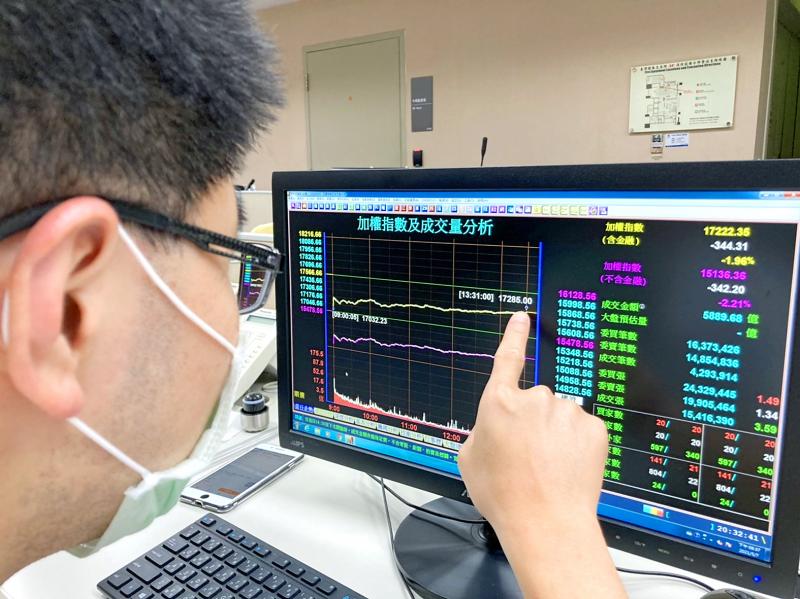The number of day traders surpassed 3 million for the first time last month, accounting for a record 14.5 percent of all investors, as more embraced day trading amid a bullish stock market, Financial Supervisory Commission (FSC) data showed on Tuesday.
The number of day-trading accounts grew 41 percent from 2.19 million a year earlier to 3.09 million at the end of last month, compared with an annual rise of 7.5 percent of stock-trading accounts to 21.29 million, the data showed.
Among the 1.5 million newly opened stock-trading accounts over the past year, 90 percent were day-trading accounts, indicating that the practice has become popular among investors, the commission said.

Photo: Chen Rou-chen, Taipei Times
The ratio of day trading accounts to overall stock-trading accounts tallied 11.07 percent last year, up from 9.58 percent in 2019 and 8.37 percent in 2018, data showed.
Day-trading transactions made up about 40 percent of all transactions last month, up from 30 percent a year earlier, Taiwan Stock Exchange data showed.
Day trading has grown in popularity as investors seek to profit on price spread amid a rosy stock market, while it could also be attributed to an extension of a tax cut on day-trading transactions, a commission official said by telephone on Wednesday.
Day trading can be risky, especially for investors who are not familiar with their targeted stocks or who make investment decisions based on hearsay or opinions, the official said.

South Korea’s equity benchmark yesterday crossed a new milestone just a month after surpassing the once-unthinkable 5,000 mark as surging global memory demand powers the country’s biggest chipmakers. The KOSPI advanced as much as 2.6 percent to a record 6,123, with Samsung Electronics Co and SK Hynix Inc each gaining more than 2 percent. With the benchmark now up 45 percent this year, South Korea’s stock market capitalization has also moved past France’s, following last month’s overtaking of Germany’s. Long overlooked by foreign funds, despite being undervalued, South Korean stocks have now emerged as clear winners in the global market. The so-called “artificial intelligence

Chinese artificial intelligence (AI) start-up DeepSeek’s (深度求索) latest AI model, set to be released as soon as next week, was trained on Nvidia Corp’s most advanced AI chip, the Blackwell, a senior official of US President Donald Trump’s administration said on Monday, in what could represent a violation of US export controls. The US believes DeepSeek will remove the technical indicators that might reveal its use of American AI chips, the official said, adding that the Blackwells are likely clustered at its data center in Inner Mongolia, an autonomous region of China. The person declined to say how the US government received

‘SEISMIC SHIFT’: The researcher forecast there would be about 1.1 billion mobile shipments this year, down from 1.26 billion the prior year and erasing years of gains The global smartphone market is expected to contract 12.9 percent this year due to the unprecedented memorychip shortage, marking “a crisis like no other,” researcher International Data Corp (IDC) said. The new forecast, a dramatic revision down from earlier estimates, gives the latest accounting of the ongoing memory crunch that is affecting every corner of the electronics industry. The demand for advanced memory to power artificial intelligence (AI) tasks has drained global supply until well into next year and jeopardizes the business model of many smartphone makers. IDC forecast about 1.1 billion mobile shipments this year, down from 1.26 billion the prior

FORTUNES REVERSED: The new 15 percent levies left countries with a 10 percent tariff worse off and stripped away the advantage of those with a 15 percent rate In a swift reversal of fortunes, countries that had been hardest hit by US President Donald Trump’s tariffs have emerged as the biggest winners from the US Supreme Court’s decision to strike down his emergency levies. China, India and Brazil are among those now seeing lower tariff rates for shipments to the US after the court ruled Trump’s use of the International Emergency Economic Powers Act to impose duties was illegal. While Trump subsequently announced plans for a 15 percent global rate, Bloomberg Economics said that would mean an average effective tariff rate of about 12 percent — the lowest since